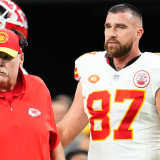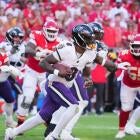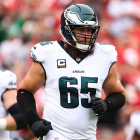
Agent's Take: Why 49ers can't afford not addressing All-Pro Trent Williams' contract demands
The 49ers would pay a different price without Williams manning their O-line

San Francisco 49ers wide receiver Brandon Aiyuk's discontent with his contract situation was well-known. Aiyuk expressed his displeasure at various points during the offseason on different social media platforms. He skipped offseason workouts and subjected himself to a $101,716 fine for missing the three-day mandatory minicamp held June 4-6. Aiyuk has been "holding in" since reporting to the opening of training camp on July 23 in an effort to get a new contract from the 49ers or a trade to a team he deems acceptable.
Left tackle Trent Williams' contract unhappiness was obscured by Aiyuk's since he attended San Francisco's mandatory minicamp. Unlike Aiyuk, Williams didn't report to 49ers training camp.
Williams' source of unhappiness
Williams signed a six-year, $138.06 million contract, averaging $23.01 million per year, with the 49ers as an unrestricted free agent in March 2021. The deal made Williams the NFL's highest-paid offensive lineman just ahead of then-Green Bay Packers offensive tackle David Bakhtiari's $23 million per year.
At the beginning of this offseason, Williams was the league's third-highest-paid offensive lineman. He's dropped down to sixth because of deals signed by Christian Darrisaw, Penei Sewell and Tristan Wirfs.
The Detroit Lions got the ball rolling in April by signing Sewell, a right tackle, to a four-year, $112 million contract extension, averaging $28 million per year. Sewell's deal also established a new record for offensive linemen with $85 million in guarantees. Out of the $85 million, $42,986,236 was fully guaranteed at signing.
Typically, a right tackle isn't at the top of the NFL's offensive lineman salary hierarchy. It's usually a left tackle.
Darrisaw became the league's highest-paid left tackle at $26 million per year last month at the start of Minnesota Vikings training camp. He signed a four-year, $104 million extension worth up to $113 million through salary escalators. Darrisaw has $77,516,929 of guarantees where $43.725 million was fully guaranteed at signing.
Wirfs eclipsed Sewell several days ago with the five-year, $140.625 million extension, averaging $28.125 million per year, he received from the Tampa Bay Buccaneers. His $88.244 million in guarantees is the most ever for an offensive lineman. The amount fully guaranteed at signing was $52.44 million.
Williams is under contract through 2026 for $77.31 million. He is scheduled to make $20.9 million on a $31,568,542 salary cap number this season. Williams' 2025 and 2026 compensation is $23.35 million and $33.06 million, respectively.
From a pure cash standpoint, Wirfs is the only offensive lineman scheduled to make more than Williams for the remaining years of his contract. Wirfs has $78.244 million from 2024 through 2026.
The biggest problems for Williams are the last of his guaranteed money was in 2023 and the balloon payment in 2026. Williams' 2026 compensation was specifically inflated so his average yearly salary would exceed Bakhtiari's. Playing the sixth year for $33.06 million seemed unlikely when Williams signed, considering he was going to be 38 in 2026.
Williams is vulnerable in the unlikely event he suffers a steep decline this season. The 49ers would pick up $14,966,219 of 2025 salary cap room by releasing Williams early next offseason.
Financial consequences of Williams' holdout
Williams is being fined $50,000 for each day of training camp he misses. There's an additional penalty of one week's base salary (1/18th of salary) for each preseason game missed with players signing contracts as unrestricted free agents, like Williams did. My understanding is Williams is still subject to the one week's salary fine, although his contract was restructured for salary cap purposes in 2022 and 2023.
Williams has a $20.05 million base salary this season so an additional $1,113,889 is at risk for every skipped exhibition contest. As a player on a veteran contract, these fines are mandatory and can't be reduced or waived.
The financial consequences for Williams run much deeper than the fines. A team can also recover a portion of a player's signing bonus.
Fifteen percent of the prorated amount of signing bonus can be recouped on the sixth day of a training camp holdout. It's 1% for each additional missed day with a maximum of 25% of the prorated amount during training camp. An additional 25% can be recovered with the first missed regular-season game. After four missed weeks in the regular season, a team can recover 1/18th of the prorated amount for each additional week of the player's absence. The maximum a team can recover in a season is the entire prorated amount of the player's signing bonus in that contract year.
Williams' $30.1 million signing bonus is prorated at $6.02 million annually on the salary cap through 2025. He could be out $1.505 million in addition to the daily $50,000 fine and the extra $1,113,889 if his holdout continues through Aug. 10 when the 49ers play their first preseason game against the Tennessee Titans. The maximum 25% that can be recovered from 2024 signing bonus proration in a holdout that doesn't extend into the regular season is $1.505 million. Recoupment of signing bonus in a training camp holdout is at a team's discretion.
Williams' leverage
Williams isn't a stranger to lengthy holdouts, which should be a cause for concern for the 49ers. The financial ramifications to Williams aren't going to be a deterrent. Williams withheld his services from the Washington Commanders in 2019 until Oct. 30, a day after the trading deadline. He held out because he wanted his contract addressed, which didn't happen, and there was also a dispute over Washington's handling of a medical issue.
Williams' willingness to take contract disputes to an extreme and his importance to the 49ers provides him some leverage. Outside of quarterback Brock Purdy, Williams is probably San Francisco's most indispensible offensive player. Despite being 36 years old, Williams is widely considered as the NFL's best left tackle. He's been named an All-Pro in each of the last three seasons. Without Williams, San Francisco has a relatively weak offensive line.
Tyreek Hill model
The Miami Dolphins may have provided the 49ers with a roadmap to handle Williams' dissatisfaction with his contract. Hill had three years left on the four-year, $120 million contract extension he signed in March 2022 when he was acquired from the Kansas City Chiefs. On paper, Hill's 2022 contract extension made him the NFL's first $30 million-per-year non-quarterback.
Hill had $87.6 million in the three remaining years on his contract. There was $19.665 million this year, $22.935 million in 2025 and $45 million in 2026. The last of the guaranteed money in Hill's contract was this year.
Hill didn't get a contract extension. The existing three years were reworked where a total of $2.4 million was added over three years and money was redistributed. Hill's 2024 compensation increases by $6.585 million to $26.25 million. He gets a $4.815 million raise in 2025 so he is making $27.75 million next year. Hill is $11.4 million better off in 2024 and 2025 than in his initial Dolphins contract. His 2026 compensation drops by $9 million to $36 million.
Equally important is Hill's increased contract security. The $54 million in 2024 and 2025 is fully guaranteed and the $11 million of Hill's 2026 compensation is guaranteed for injury at signing and becomes fully guaranteed on the third day of the 2026 league year.
Hill also has $1.5 million of incentives in the new deal. He gets $500,000 each year for 50% or more regular-season offensive playtime and 50% or more offensive playtime during a playoff win.
Proposed solution
A contract extension like running back Christian McCaffrey received doesn't make a lot of sense for the 49ers given Williams' age, although running backs almost never sign lucrative second veteran contracts. McCaffrey, who is 28, had two years left on his contract when he signed a two-year extension for $38 million, averaging $19 million per year, in early June right before the mandatory minicamp.
Extending Williams' contract for two years would make him 40 years old in 2028, the final year. It would be a risky proposition. Although Williams isn't showing signs of slowing down, Father Time is undefeated.
A modified version of how the Los Angeles Rams handled Aaron Donald's contract situation in 2022 could be in order for Williams. The Rams essentially ripped up Donald's contract with three years worth $55 million and replaced it with a three-year, $95 million deal, making him the NFL's highest-paid non-quarterback at $31,666,667 per year rather than giving him a contract extension where new years were included.
Donald got a $40 million raise over his existing three contract years in his new deal. His 2022 compensation went from $14.25 million to $46.25 million because of the renegotiation. Donald made $60 million over 2022 and 2023 instead of the originally slated $33.25 million.
The Williams renegotiation wouldn't be to the same degree. Williams' existing deal could be replaced with a contract for $84.75 million over three years. At $28.25 million per year, Williams would be just ahead of Wirfs as the NFL's highest-paid offensive lineman.
The deal could be flat where Williams makes $28.25 million in each year. This would mean Williams gets a $7.35 million raise this year and 2025 would increase by $4.9 million. A total of $12.25 million would be added to 2024 and 2025 where Williams would be making $56.5 million over these years rather than his scheduled $44.25 million. In the process, Williams' 2026 compensation would decrease by $4.81 million. He would be getting $7.44 million more over these three years than in his current contract.
Large annual game day active roster bonuses are customary with 49ers veteran contracts of any significance. The primary benefit of the roster bonuses is they provide the 49ers some financial relief with injuries. The per-game amount is only payable if the player is on the active list for that particular game.
The 49ers included $750,000 of annual per-game roster bonuses ($44,117.65 each game) in Williams' current contract. The concept would continue with the new deal. The 49ers would be justified in insisting that the amounts double to $1.5 million in 2025 and 2026.
Hill's original Dolphins contract didn't contain per-game roster bonuses. His reworked contract has $1 million, $1.8 million and $1 million of per-game roster bonuses in 2024, 2025 and 2026.
Williams would also get the security that he is currently lacking. His $27.5 million of 2024 compensation, besides the $750,000 of per-game roster bonuses and the $26.75 million from 2025, which excludes the $1.5 million of per-game roster bonuses, would be fully guaranteed. The $100,000 workout bonus Williams has in each contract year would be eliminated since he never earns them. Williams' $54.25 million fully guaranteed at signing would exceed Wirfs' by $1.85 million.
The 2026 contract would be completely unsecured. That might not be too problematic for Williams because the 49ers would likely get 2024 cap relief by using a signing/option bonus model in his new deal with dummy/voiding 2028 and 2029 contract years being added in the process. A dummy/voiding 2027 contract year already exists.
San Francisco prefers structuring its most lucrative contracts with a signing bonus and an option bonus. Up to $26.290 million of the $27.5 million 2024 guarantee could be a signing bonus given that $1.21 million is Williams' league minimum base salary in 2024. The 49ers would also potentially lower Williams' $34,106,777 2025 cap number because of the option bonus.
An option bonus is essentially an additional signing bonus that's usually paid in the second or third year of a contract to exercise a later year or years in a deal. Since an option bonus is given the same treatment on the salary cap as signing bonus, it is also prorated or evenly spread out over the life of a contract for a maximum of five years, beginning in the year of exercise. The drawback is the 49ers are likely to have a significant amount of dead money, a salary cap charge for a player no longer on a team's roster, in 2027 because of the extra bonus proration due to the option bonus and Williams' voiding/dummy years.
Final thoughts
Engaging in a high-stakes game of chicken with Williams waiting to see who blinks first isn't advisable. He's already demonstrated a willingness to take a stand that most players won't. One interesting wrinkle would be the 49ers eventually kicking the tires on the often-injured Bakhtiari, who is a free agent, if Williams' holdout can't be resolved in a timely fashion.

















